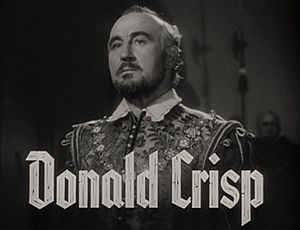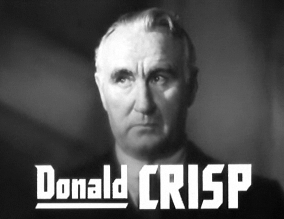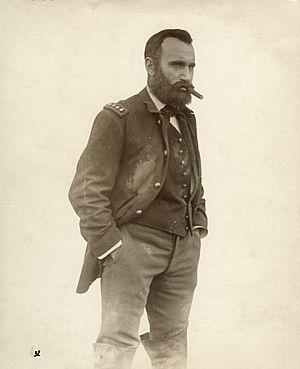Donald Crisp facts for kids
Quick facts for kids
Donald Crisp
|
|
|---|---|

From trailer for The Sea Hawk (1940)
|
|
| Born |
George William Crisp
27 July 1882 Bow, London, England, UK
|
| Died | 25 May 1974 (aged 91) Van Nuys, Los Angeles, California, U.S.
|
| Occupation |
|
| Years active | 1908–63 |
| Political party | Republican |
| Spouse(s) |
|
Donald William Crisp (born George William Crisp, 27 July 1882 – 25 May 1974) was an English film actor. He also worked as a producer, director, and screenwriter. His amazing career started in the early days of silent films and lasted all the way into the 1960s. He won an Academy Award for Best Supporting Actor in 1942 for his role in the movie How Green Was My Valley.
Contents
Donald Crisp's Early Life
Donald Crisp was born George William Crisp in Bow, London, England, on 27 July 1882. He was the youngest of ten children in his family. His parents were Elizabeth and James Crisp. In 1901, he lived with his parents and worked as a driver.
Crisp later made up some stories about his early life. He often claimed he was born in Scotland in 1880. He even kept a Scottish accent throughout his time in Hollywood! However, he had no real connection to Scotland. Still, in 1996, a special plaque was put up in Aberfeldy, Scotland, to remember him. He also sometimes said his father was a farmer or a doctor for the King. He even claimed he went to famous schools like Eton and Oxford.
Starting His Career in Entertainment
In 1906, Donald Crisp was traveling to the United States. During a ship concert, his singing caught the eye of John C. Fisher, an opera manager. Fisher offered him a job right away. Crisp spent his first year in New York City working in opera. The next year, he became a stage director.
While touring with the opera company, Crisp became very interested in the theatre. By 1910, he started using the name Donald. He worked as a stage manager for the famous entertainer George M. Cohan. This is where he met and became friends with film director D. W. Griffith. When Griffith moved to Hollywood in 1912, Crisp went with him.
From 1908 to 1930, Crisp acted in almost 100 silent films. Many of these were small roles. However, he played General Ulysses S. Grant in Griffith's important film The Birth of a Nation in 1915. He also had a big role in Griffith's 1919 film Broken Blossoms. In that movie, he played "Battling Burrows," a tough and mean father.
Becoming a Film Director
Crisp worked closely with D.W. Griffith for several years. He learned a lot from Griffith, who was a master at telling stories through film. This made Crisp want to direct movies himself. His first movie as a director was Little Country Mouse in 1914.
Back then, directors often made many films in one year. Over the next fifteen years, Crisp directed about 70 films. Some of his most famous directing jobs include The Navigator (1924) with Buster Keaton. He also directed Don Q, Son of Zorro (1925) with Douglas Fairbanks.
Later, Crisp was asked why he stopped directing and went back to acting full-time. He said directing became too tiring. He often had to hire relatives of studio bosses, which he didn't like. His last movie as a director was The Runaway Bride in 1930.
Military Service
Donald Crisp also served in the military. During World War I (1914–1918), he worked for British army intelligence. In 1930, he became an American citizen. During World War II (1939–1945), he served in the United States Army Reserve. He reached the rank of colonel.
Returning to Acting Full-Time

When "talkies" (movies with sound) became popular, Crisp stopped directing. After 1930, he focused only on acting. He became a very popular character actor. Throughout the 1930s and 1940s, he appeared in many different roles. He acted alongside huge stars of the time.
Some of his famous movies include:
- The Little Minister (1934) with Katharine Hepburn
- Mutiny on the Bounty (1935) with Charles Laughton and Clark Gable
- Jezebel (1938) with Bette Davis and Henry Fonda
- Wuthering Heights (1939) with Laurence Olivier
- The Sea Hawk (1940) with Errol Flynn
Crisp was a very flexible supporting actor. He could play both kind and mean characters. He often played loving fathers or charming old men in movies like National Velvet and Lassie Come Home.
His most famous role was as the quiet but loving father in How Green Was My Valley (1941). This movie was directed by John Ford. The film won five Oscars, including Best Picture. Donald Crisp won the Oscar for Best Supporting Actor in 1942.
Later Years and Achievements
Donald Crisp continued acting in movies throughout the 1950s and early 1960s. He appeared in hundreds of films during his long career. Some people say he acted in more movies than almost anyone else! His last movie role was as Grandpa Spencer in Spencer's Mountain (1963). This film later inspired the popular 1970s TV show The Waltons.
Crisp was in his eighties when he stopped acting. He kept working because he loved it, even though he didn't need the money. He was married three times. He died in 1974, just before his 92nd birthday, after having several strokes. He is buried in Forest Lawn Memorial Park Cemetery in Glendale, California.
Donald Crisp was a strong supporter of the Republican Party. He even helped with political campaigns.
On February 8, 1960, Donald Crisp received a star on the Hollywood Walk of Fame. This was to honor his important work in the movie industry. His star is located at 1628 Vine Street.
Selected Filmography
As an Actor
- The Birth of a Nation (1915) as Gen. U.S. Grant
- Intolerance (1916) (uncredited)
- Broken Blossoms (1919) as Battling Burrows
- The Black Pirate (1926) as MacTavish
- The Viking (1928) as Leif Ericsson
- The Return of Sherlock Holmes (1929) as Colonel Moran
- Svengali (1931) as The Laird
- Red Dust (1932) as Guidon
- Mutiny on the Bounty (1935) as Burkitt
- Mary of Scotland (1936) as Huntly
- The Charge of the Light Brigade (1936) as Col. Campbell
- The Life of Emile Zola (1937) as Maitre Labori
- Jezebel (1938) as Dr. Livingstone
- The Dawn Patrol (1938) as Phipps
- Wuthering Heights (1939) as Dr. Kenneth
- The Private Lives of Elizabeth and Essex (1939) as Francis Bacon
- The Sea Hawk (1940) as Sir John Burleson
- Knute Rockne, All American (1940) as Father John Callahan
- Dr. Jekyll and Mr. Hyde (1941) as Sir Charles Emery
- How Green Was My Valley (1941) as Gwilym Morgan
- Lassie Come Home (1943) as Sam Carraclouch
- The Uninvited (1944) as Commander Beech
- National Velvet (1944) as Mr. Herbert Brown
- The Valley of Decision (1945) as William Scott
- Ramrod (1947) as Jim Crew
- Whispering Smith (1948) as Barney Rebstock
- Prince Valiant (1954) as King Aguar
- The Long Gray Line (1955) as Old Martin
- The Man from Laramie (1955) as Alec Waggoman
- The Last Hurrah (1958) as Cardinal Martin Burke
- A Dog of Flanders (1959) as Jehan Daas
- Pollyanna (1960) as Mayor Karl Warren
- Greyfriars Bobby: The True Story of a Dog (1961) as James Brown
- Spencer's Mountain (1963) as Grandpa Zubulon Spencer (final film role)
As a Director
- Ramona (1916)
- The Goat (1918)
- Johnny Get Your Gun (1919)
- The Six Best Cellars (1920)
- The Navigator (1924) (co-directed with Buster Keaton)
- Don Q, Son of Zorro (1925)
- The Cop (1928)
- The Runaway Bride (1930)
Images for kids
See also
 In Spanish: Donald Crisp para niños
In Spanish: Donald Crisp para niños
- List of actors with Academy Award nominations
 | Isaac Myers |
 | D. Hamilton Jackson |
 | A. Philip Randolph |





